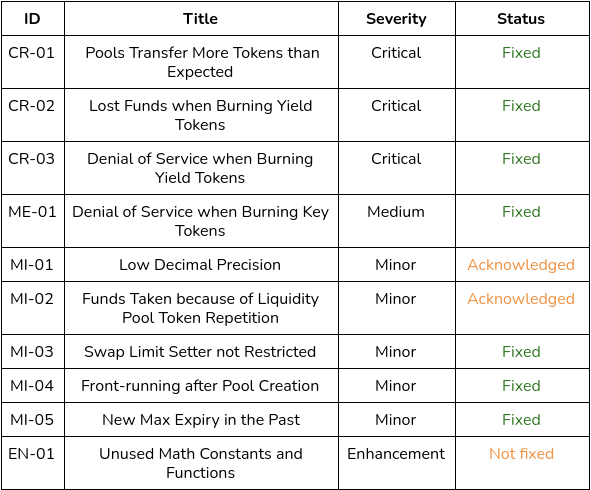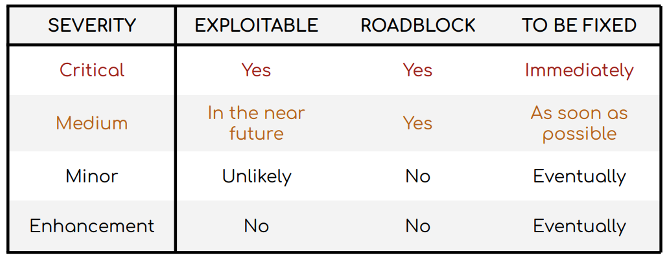Introduction
CoinFabrik was asked to audit the contracts for the AlexGo project. First we will provide a summary of our discoveries and then we will show the details of our findings.
Summary
The contracts audited are from the alex-v1 repository at
https://github.com/alexgo-io/alex-v1. The audit is based on the commit
0913c9eb0c8f79b3cd0b843641075ce27d437c96. Fixes were made and rechecked based on the commit feb43898de520ca1c55a6d8bc5bcf2d6f7df8ffa.
Contracts
The audited contracts are:
● clarity/contracts/equations/weighted-equation.clar: Library for
weighted math functions.
● clarity/contracts/equations/yield-token-equation.clar: Library for
yield token math functions.
● clarity/contracts/pool/alex-reserve-pool.clar: Staking contract.
● clarity/contracts/pool/collateral-rebalancing-pool.clar: Lending
and borrowing pool contract with pools of variable weights.
● clarity/contracts/pool/fixed-weight-pool.clar: Contract with
fixed-weight liquidity pools.
● clarity/contracts/pool/liquidity-bootstrapping-pool.clar:
Contract with liquidity pools that increase bootstrapped token weight over
the time.
● clarity/contracts/pool/yield-token-pool.clar: Liquidity pools for
token and correspondent yield token pairs.
Analyses
The following analyses were performed:
● Misuse of the different call methods
● Integer overflow errors
● Division by zero errors
● Front running attacks
● Reentrancy attacks
● Misuse of block timestamps
● Softlock denial of service attacks
● Functions with excessive gas cost
● Missing or misused function qualifiers
● Needlessly complex code and contract interactions
● Poor or nonexistent error handling
● Failure to use a withdrawal pattern
● Insufficient validation of the input parameters
● Incorrect handling of cryptographic signatures
Findings and Fixes

Severity Classification
Security risks are classified as follows:
● Critical: These are issues that we manage to exploit. They compromise the system seriously. They must be fixed immediately.
● Medium: These are potentially exploitable issues. Even though we did not
manage to exploit them or their impact is not clear, they might represent a
security risk in the near future. We suggest fixing them as soon as possible.
● Minor: These issues represent problems that are relatively small or difficult to take advantage of but can be exploited in combination with other issues. These kinds of issues do not block deployments in production environments. They should be taken into account and be fixed when possible.
● Enhancement: These kinds of findings do not represent a security risk. They are best practices that we suggest to implement.
This classification is summarized in the following table:

Issues Found by Severity
Critical Severity Issues
CR-01 Pools Transfer More Tokens than Expected
The function add-to-position() in the contractsliquidity-bootstrapping-pool.clar and fixed-weight-pool.clar receives as a parameter how many tokens the user would like to provide to the pool. In order to conform the pool balance, the function calculates the amount of tokens y to be provided based on the amount of token x. As a consequence, the actual value provided to the pool could be greater than the one specified by the user. The result would be the contract moving more tokens than the ones consented by the user.
Recommendation
The actual amount of token y to be provided to the pool should never be greater than the value defined by the user (dy). This could be done by adding an asserts! that compares those values.
Solution
Fixed according to the recommendation
CR-02 Lost Funds when Burning Yield Tokens
In a collateral rebalancing pool (collateral-rebalancing-pool.clar), liquidity providers get an amount of yield and key tokens equal to the provided liquidity multiplied by ltv (Loan-to-Value). When yield tokens are burnt calling reduce-position-yield(), the pool is completely rebalanced, swapping all the collateral. Then, for instance, if a user owns 100% of the pool value and burns all his yield tokens, the balance stored in the blockchain will be reduced to zero.
However, the user gets transferred only the exact amount of yield token burnt (balance * ltv). Since this does not represent the actual value provided, users will realize they lost funds when they try to burn their key tokens and receive zero tokens because the pool is empty.
Recommendation
Subtract from the pool balance the same amount transferred to the user.
Solution
Fixed according to the recommendation.
CR-03 Denial of Service when Burning Yield Tokens
In a collateral rebalancing pool (collateral-rebalancing-pool.clar), when yield tokens are burnt calling reduce-position-yield(), the pool is completely rebalanced, swapping all the collateral (i.e., it becomes a 0-100 pool). As a consequence, it becomes unusable for token swaps since either the input or output value will be greater than the zero-balance, causing the transaction to revert because of the assertions made in weighted-equation.clar. These assertions verify the value deposited to a pool in an A token is lower than that token’s balance multiplied by a ratio, and also the amount of B tokens given in exchange is lower than that token’s balance multiplied by a ratio.
Moreover, this Denial of Service would be most of the time unintentionally executed by the users and would persist until someone provides liquidity to the pool again, incrementing the zero-balance.
Solution
Swap functions can only be called before the expiration block.
Medium Severity Issues
ME-01 Denial of Service when Burning Key Tokens
In a collateral rebalancing pool (collateral-rebalancing-pool.clar), if all the key tokens were burnt and the reserve pool (alex-reserve-pool.clar) does not have tokens in its balance, users might not burn any amount of their yield tokens.
Since reduce-position-yield() swaps all the collateral, a new balance of the token is calculated based on the previous balance and the amount of tokens received after the swap. Then, the function calculates a variable
shares-to-yield which is equal to the amount of yield tokens the user wants to burn (shares) divided by its total supply (yield-supply). Afterwards, it calculates dy, the product of new-bal-y and shares-to-yield, and compares dy to shares.
Since the pool only has a value equal to the yield supply, it is swapped and fees are taken out, dy will be lower than shares. Therefore, in line 496, it calls alex-reserve-pool.remove-from-balance() to transfer the shortfall, but if alex-reserve-pool does not have tokens, it will revert.
Solution
Changes made to fix CR-02 solved this issue.
Minor Severity Issues
MI-01 Low Decimal Precision
Clarity integer types are stored in 128-bit storage slots. In order to represent the fractional part, a fixed point precision is used with 8 decimal for the fractional part and 30 for the whole part. However, this precision is low and can result in significant decimal errors in the long term.
Recommendation
Since the whole part is more than long enough, the precision could be increased to, for instance, 18 decimal places.
Solution
The development team is studying the implementation of a higher decimal
precision.
MI-02 Funds Taken because of Liquidity Pool Token Repetition
Whenever users provide liquidity to a pool, they receive liquidity pool tokens (LP tokens). If two pools were created with the same LP token, users could provide liquidity in one of those pools and withdraw funds from the other. Currently, only the contract owners can create pools and it is at their discretion.
Recommendation
Restrict LP token repetition, not only in each contract, but also across pool
contracts: fixed-weight-pool.clar, liquidity-bootstrapping-pool.clar, yield-token-pool.clar. These are the pools that share the same trait for the LP tokens.
Solution
The development team is considering maintaining a registry contract that is
updated every time a pool is created and checks if the principal address of the pool token passed is already in use.
MI-03 Swap Limit Setter not Restricted
Amounts swapped are limited in order not to be larger than a certain percentage of total balance (MAX-IN-RATIO and MAX-OUT-RATIO). These values are set initially to 30% in weighted-equation.clar and yield-token-equation.clar, but they can be modified without restriction. It can result in a denial of service if the value is too small.
Recommendation
Setters should check the new value is, at least, greater than zero with an asserts!.
Solution
Fixed according to the recommendation.
MI-04 Front-running after Pool Creation
Liquidity bootstrapping pools (liquidity-bootstrapping-pool.clar) are created with a default value for maximum and minimum prices for bootstrapped token (maximum is set to 10^8 and minimum to zero). They can be changed, but only calling the setter in another transaction. Since the pool creator must provide liquidity in the same transaction they created the pool, under certain market conditions, an attacker might find it profitable to execute a swap immediately after the pool creation and before the maximum and minimum are modified.
Recommendation
Add two parameters to create-pool() to assign initial values for price-x-min and price-x-max.
Solution
Fixed according to the recommendation.
MI-05 New Max Expiry in the Past
In yield-token-pool.clar, max-expiry is a variable essential to calculate the time to maturity. If this variable is lower or equal to the current block, most of the transactions will revert, causing a denial of service in that contract. Currently, its setter, set-max-expiry(), does not check if the new value is valid.
Recommendation
Add an asserts! to check new-max-expiry is greater than block-height before assigning it to max-expiry.
Solution
Fixed according to the recommendation.
Enhancements
EN-01 Unused Math Constants and Functions
Useful math functions and constants are copied in the contracts. However, they are not always used by the rest of the contract functions and make the deployment more expensive. For instance, in collateral-rebalancing-pool.clar, pow-up(), ONE_10, log-fixed() and ln-fixed() are not used.
Recommendation
Remove the functions that are not necessary for the contracts.
Other Considerations
collateral-rebalancing-pool.claruses an approximation for the error function (Abramowitz and Stegun) which has a high maximum error. The recommendation is to extensively test it to assure it does not have unexpected implications.- In
yield-token-poolcontract,max-expiryvalue is based on a 15-second block time. AlexGo team explained it is set for the mocknet environment. It should be changed to 10 minutes when it is deployed to Stacks mainnet.
Conclusion
We found the contracts to be simple and straightforward and have an adequate amount of documentation, but not always up-to-date. Three critical, one medium and five minor severity issues were found. Additionally, an enhancement was proposed. The development team fixed seven issues and acknowledged two minor issues.
Disclaimer: This audit report is not a security warranty, investment advice, or an approval of the AlexGo project since CoinFabrik has not reviewed its platform. Moreover, it does not provide a smart contract code faultlessness guarantee.














